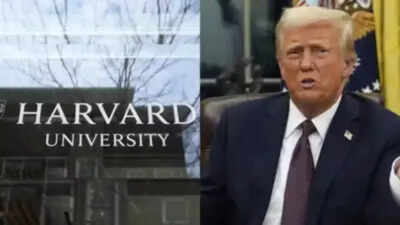
Trump blocks foreign students from entering Harvard over security concerns
In a sweeping proclamation issued Wednesday evening, Trump barred the entry of foreign students under Harvard-hosted student and exchange visitor visas, citing national security concerns.
The order, effective immediately, suspends new admissions under the F, M, and J visa categories, halting the arrival of students who were set to begin their academic journeys at Harvard.The proclamation also places current international students and researchers at the university under review, directing the U.S. Department of State to consider revoking existing visas on a case-by-case basis. The suspension is set to last for six months, with the possibility of an extension.The move comes on the heels of the Department of Homeland Security's earlier, failed attempt to decertify Harvard’s ability to enrol international students — a decision that was blocked by a federal court after the university sued. Trump’s proclamation appears to be a legal workaround, invoking presidential authority under Sections 212(f) and 215(a) of the Immigration and Nationality Act — the same basis used for the travel bans upheld by the U.S.
Supreme Court during his first term.
A Policy with Far-Reaching Impact
Harvard currently hosts more than 10,000 international students and scholars. The ban disrupts not just their mobility, but also their education, research, and career trajectories. While current students may remain temporarily, their visa status is now subject to review under the banner of "national interest."Unlike previous broad travel bans that targeted specific countries, this order is unique in singling out one academic institution.
It accuses Harvard of failing to report disciplinary and criminal information regarding international students — despite the university stating that no such convictions exist for the past two years.The administration’s rationale includes a mix of national security concerns, allegations of ties to the Chinese government, and accusations that Harvard has hosted individuals affiliated with the Chinese military.
In a supporting fact sheet, the administration pointed to over $150 million in foreign funding since 2020, rising campus crime rates, and support for diversity and inclusion policies as further justification.
Shifting Sentiments Among Global Students
This proclamation has introduced fresh instability for students who once saw American education as a sure investment in their futures. Many who had secured admission to Harvard are now left in limbo, unable to enter the U.S.
and uncertain whether they’ll be able to pursue their degrees at all.The ban is likely to accelerate a trend already in motion — international students exploring alternative destinations such as Germany, Ireland, Australia, and Asian countries, where policies have remained relatively stable and welcoming. Institutions in those regions may now benefit from an outflow of highly qualified students deterred by U.S.
restrictions.For generations, the United States has been the top destination for international students seeking academic excellence, innovation, and global opportunities. From Ivy League campuses to cutting-edge research labs, American institutions have drawn the best minds from across the world. But the latest move by the U.S. President Donald Trump has cast a shadow over that reputation. With rising visa restrictions and unpredictable policy shifts, many are questioning whether the U.S.
remains a reliable choice for higher education.
Beyond Harvard: A Larger Pattern?
While the immediate order targets Harvard, it raises concerns that similar actions could extend to other American universities, especially those receiving significant foreign funding or engaged in global partnerships. The precedent set by targeting a specific institution based on political grievances introduces a degree of unpredictability previously unseen in U.S.
higher education policy.International students — once seen as cultural ambassadors and economic contributors — now face a climate where geopolitical narratives can redefine their eligibility overnight. Even institutions with strong global reputations are no longer immune from federal scrutiny or political backlash.
The Long-Term Cost to U.S. Education
International students are integral to American universities, contributing billions of dollars annually to the economy, diversifying campuses, and driving innovation in STEM and business fields.
Policies that restrict their participation may erode the global standing of U.S. education, damage institutional competitiveness, and discourage future applicants.As the world watches Harvard’s next legal move — and the outcome of any new court challenges — many students are quietly shifting their aspirations elsewhere. In an increasingly uncertain environment, academic excellence alone may no longer be enough to outweigh the risks of studying in the United States.

 1 day ago
54
1 day ago
54




























 English (US)
English (US)